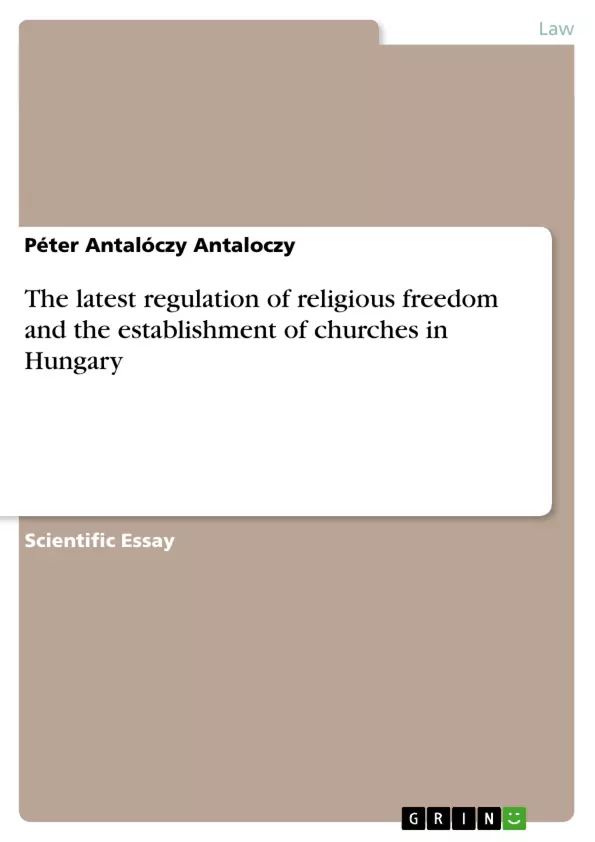The Hungarian constitution making process grounding and improving the change in the political system has been aided since the 1980s by several studies containing modern legal principles and human and fundamental rights, as well as presenting the constitutional institutions of developed civil countries. The preamble of the modified constitution made during the national round table discussions preparing the change in the political system in 1989 declared that the Parliament established the text of the Hungarian constitution in order to facilitate peaceful political transmission into a state based on the rule of law realising pluralism, parliamentary democracy and social market economy – till the enactment of the new constitution. Even though intensive political and professional negotiations were conducted between 1994 and 1998 for the preparations of a modern rule of law constitution, these remained unsuccessful. At the same time, however, significant changes happened in our globalised and multicultural world1, which made the adjustment of national constitution to international standards timely.
Inhaltsverzeichnis (Table of Contents)
- Introduction
- Freedom of thought, conscience and religion
- The new act on churches
Zielsetzung und Themenschwerpunkte (Objectives and Key Themes)
This article explores the latest Hungarian legal framework surrounding religious freedom and the establishment of churches, specifically focusing on the changes introduced by the Fundamental Law and the new act on churches. It examines the historical context of these developments and analyzes the impact of these changes on religious freedom in Hungary. Key themes include:- The relationship between state and church in a secularized world
- The balance between religious freedom and preventing abuses of religious freedom
- The role of Christianity in Hungarian national identity
- The legal definition and regulation of churches and religious communities
- The impact of international law and European standards on Hungarian constitutional law
Zusammenfassung der Kapitel (Chapter Summaries)
Introduction
This section introduces the historical context surrounding the development of Hungarian constitutional law, including the changes made during the political transition in 1989 and the failed attempts to create a modern constitution between 1994 and 1998. The author emphasizes the impact of globalization and multiculturalism on the need to adapt national constitutions to international standards. The passage then highlights the significance of the 2010 parliamentary elections which resulted in the enactment of the Fundamental Law, replacing the 1949 Constitution and act IV of 1990 on the freedom of conscience and religion and churches with act C of 2011 on the right to the freedom of conscience and religion, and the status of churches, religions and religious communities, modified by act CCVI of 2011.Freedom of thought, conscience and religion
This section explores the provisions of the Fundamental Law regarding the freedom of thought, conscience, and religion, highlighting the importance of these rights and the potential for conflicts with the state's ideological neutrality. The author discusses the inclusion of the phrase “God bless the Hungarians” in the Fundamental Law and argues that, while it may be perceived as a violation of state neutrality, it can be viewed in the same light as similar phrases in other countries' national symbols. The section also examines the National Avowal's acknowledgment of the role of Christianity in Hungarian history and the importance of respecting different religious traditions, acknowledging the tension between this principle and the Constitutional Court's requirement of religious neutrality. The text delves into the legal framework of freedom of thought, conscience, and religion, clarifying the differences between these concepts and their interrelation. The author also explores the role of the state in ensuring the free flow of ideas and ideological systems while remaining ideologically neutral. The section concludes by analyzing the changes made to the legal framework for churches, specifically the shift from “church” to “churches,” emphasizing the importance of religious pluralism in a diverse society.The new act on churches
This section focuses on the new act on churches, act C of 2011, emphasizing its radical changes in relation to the previous act. The author highlights the reasoning behind these changes, namely the perceived abuse of rights by religious organizations and the need to restrict access to state funds for non-religious activities. The text explores the parliamentary petitioner's arguments for enacting the new act, including statistics comparing the number of registered churches in Hungary to other countries and the perceived increase in “religion business” and abuses of rights in Hungary.Schlüsselwörter (Keywords)
Religious freedom, freedom of conscience, freedom of religion, church, state, Hungarian law, Fundamental Law, act C of 2011, act IV of 1990, religious pluralism, religious neutrality, national identity, abuse of rights, international law, European standards.Frequently Asked Questions
What is the significance of the Hungarian Act C of 2011 on churches?
Act C of 2011 introduced radical changes to the regulation of religious communities, aiming to prevent the perceived abuse of rights by "business churches" and restricting access to state funds for non-religious activities.
How does the Hungarian Fundamental Law address religious freedom?
The Fundamental Law protects freedom of thought, conscience, and religion. However, it also acknowledges the role of Christianity in national identity, creating a debated tension with the principle of state neutrality.
What was the reason for restricting the legal status of churches in Hungary?
The government argued that many organizations were registering as churches solely for financial gain ("religion business"). The new law sought to verify the genuinely religious nature of these organizations.
Does the Hungarian state remain ideologically neutral?
While the Constitutional Court requires ideological neutrality, the inclusion of religious references in the Fundamental Law (like "God bless the Hungarians") has led to international discussions regarding the balance of state and church.
What role does international law play in Hungarian religious regulation?
The development of Hungarian constitutional law has been influenced by the need to adjust national standards to globalized, multicultural trends and European human rights standards.
- Quote paper
- Péter Antalóczy Antaloczy (Author), 2013, The latest regulation of religious freedom and the establishment of churches in Hungary, Munich, GRIN Verlag, https://www.grin.com/document/208213



